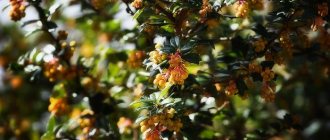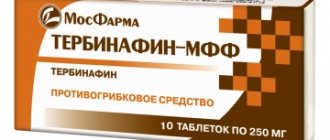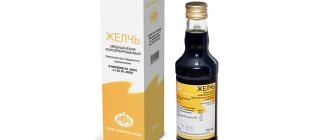Release form and composition
The drug is produced in the form of an elixir: a slightly yellowish or colorless, transparent liquid with a characteristic odor (47, 95, 155 or 235 ml each in transparent white glass bottles, closed with a screw-on plastic cap, 1 bottle in a cardboard box and instructions for use of Klosterfrau MELISANA).
100 ml of elixir contains essential oils obtained by water-steam distillation from plant materials of the following medicinal plants:
- rhizomes of medicinal ginger (Zingiber officinale Roscoe) – 714 mg;
- angelica roots (Angelica archangelica L.) – 714 mg;
- yellow gentian roots (Gentiana lutea L.) – 714 mg;
- rhizomes of elecampane (Inula helenium L.) – 714 mg;
- peel of bitter orange fruit (Citrus aurantium L. ssp. aurantium) – 714 mg;
- lemon balm leaves (Melissa officinalis L.) – 536 mg;
- Ceylon cinnamon bark (Cinnamomum zeylanicum Nees) – 321 mg;
- rhizomes of anpinia officinalis – 285 mg;
- flowers of the clove tree [Syzygium aromaticum (L.) Merr. Et Perry] – 285 mg;
- black pepper fruits (Piper nigrum L.) – 71 mg;
- nutmeg seeds (Myristica fragrans Houtt.) – 71 mg;
- Chinese cinnamon flowers (Cinnamomum cassia Blume) – 36 mg;
- cardamom fruits – 10 mg.
Auxiliary component: ethanol (59% by weight).
Klosterfrau Melisana fl. (concentrated external/oral) 95ml (Klosterfrau/Germany)
Composition and release form:
| Elixir for oral and external use | 100 ml |
| essential oils from: | |
| lemon balm leaves (Fol. Melissae) | 536 mg |
| rhizomes of elecampane (Rhiz. Helenii) | 714 mg |
| angelica roots (Rad. Angelicae) | 714 mg |
| ginger rhizomes (Rhiz. Zingiberis) | 714 mg |
| carnation flowers (Flor. Caryophylli) | 285 mg |
| rhizomes of galangal (Rhiz. Galangae) | 285 mg |
| black pepper fruit (Fruct. Piperis nigri) | 71 mg |
| gentian roots (Rad. Gentianae) | 714 mg |
| nutmeg seeds (Sem. Myristicae) | 71 mg |
| orange peel (Pericarp aurantii) | 714 mg |
| cinnamon tree bark (Cort. Cinnamomi) | 321 mg |
| cassia flowers (Flor. Cassiae) | 36 mg |
| cardamom fruit (Fruct. Cardamomi) | 10 mg |
| ethanol | 52.7 g (59% by weight, 66 vol.%) |
in bottles of 95 ml in a cardboard pack 1 bottle.
Description of the dosage form:
Transparent, colorless liquid with a characteristic taste and odor.
Characteristic:
Herbal medicine.
Pharmachologic effect:
The central effect (sedative) occurs when used for symptoms of a nervous system disorder, especially with psychovegetative complaints, stress, difficulty falling asleep, while the antispasmodic effect occurs when used for functional gastrointestinal symptoms. Essential oils of medicinal plants and the terpenes they contain have predominantly sedative and antispasmodic effects.
The therapeutic effect of a combination of essential oils and alcohol has been proven to be superior to that of alcohol.
It has an antimicrobial effect in the complex treatment of colds, especially in the early stages.
When used externally, it has antimicrobial, antiviral, antifungal (fungicidal) effects, stimulates blood circulation, and causes anesthetic and anti-inflammatory effects.
Essential oils containing terpenes and terpenoids are absorbed through intact skin and mucous membranes of the gastrointestinal tract and respiratory tract and are excreted primarily through the lungs and kidneys. Terpenes and/or their metabolites may have a therapeutic effect (expectorant effect).
The effect on the autonomic nervous system and central nervous system, as well as on the cardiovascular system and lungs, is mainly based on the absorption of essential oils and ethanol.
Indications:
For oral use in adults:
psychovegetative nervous disorders, such as: increased nervous excitability, sleep disturbances, difficulty falling asleep, headaches caused by nervous overstrain.
Dyspeptic symptoms of nervous origin (flatulence, feeling of heaviness in the stomach, lack of appetite).
Prevention and maintenance therapy for colds.
For external use:
neuralgic pain, muscle pain (myalgia).
Contraindications:
Hypersensitivity to the components of the drug, peptic ulcer of the stomach and duodenum, liver disease, alcoholism, epilepsy, brain damage, childhood.
Use during pregnancy and breastfeeding:
Contraindicated during pregnancy. Breastfeeding should be stopped during treatment.
Side effect:
When used in recommended doses, side effects are very rare.
When used orally at the beginning of treatment, the following may rarely be observed: heartburn, indigestion, feeling of heat, fatigue, dizziness, allergic skin reactions (itching). Reactions from the gastrointestinal tract disappear when taking the medicine after meals. If allergic skin reactions occur, treatment should be discontinued.
Frequent external use can lead to skin dehydration.
Drug interactions:
The effect of benzodiazepines may be enhanced. Concomitant use of alcohol and phenytoin, tolbutamide, warfarin or meprobamate may cause a decrease in the half-life of these drugs. Taking high doses of Klosterfrau Melisan simultaneously with other medications may affect the pharmacokinetics of these drugs.
Directions for use and dosage:
Inside.
With increased nervous excitability:
1–3 teaspoons of elixir (5–15 ml), before meals, after diluting with double the amount of warm water or tea. If necessary, you can sweeten with sugar or honey.
For sleep disorders:
1–3 teaspoons, pre-diluted with double the amount of warm water, 15 minutes before going to bed.
For headaches:
1–3 teaspoons of the drug, pre-diluted with double the amount of warm water.
For gastrointestinal disorders of nervous origin (flatulence, feeling of heaviness in the stomach):
1–3 teaspoons, pre-diluted with double the amount of warm water.
For colds:
at the first symptoms - 3 times a day, 1-3 teaspoons, pre-diluted with double the amount of hot water or tea.
The course of treatment should be at least 7 days.
Externally.
For neuralgia and myalgia. Apply the drug to the painful area and rub until completely dry. For sensitive skin, the drug should be diluted with double the amount of water. Should only be used on intact skin.
The duration of treatment is not limited.
Overdose:
When used orally: possible development of known side effects of alcohol.
For external use: long-term use (compresses with undiluted preparation) can lead to skin damage.
Precautionary measures:
The drug contains 59% alcohol by weight (66% by volume). When used in recommended doses, ethanol consumption ranges from 2.6 g (1 teaspoon of the drug) to 5.2 g (2 teaspoons of the drug). When prescribing 10 ml (2 teaspoons) of Klosterfrau Melisan, the level of ethanol in the blood does not exceed 0.1‰.
When administered orally: due to the high concentration of alcohol in the drug, taking the drug even in diluted form on an empty stomach can cause symptoms such as heartburn, stomach pain, nausea or vomiting. In this case, the medicine should be prescribed after meals.
For external use: patients with allergic reactions or skin lesions should undergo a sensitivity test (on the crook of the arm) before starting treatment. Alcohol dehydrates the skin if used frequently.
Contact of the drug with the eyes should be avoided. If the drug gets into the eyes, they should be rinsed with water for 10 minutes.
On open wounds, alcohol causes a slight burning sensation.
Contraindications
Absolute contraindications for Klosterfrau MELISANA, regardless of the method of use of the elixir, are:
- children and adolescents up to 18 years of age;
- hypersensitivity to any component of the drug.
Additional contraindications when taking the solution orally:
- colitis, enteritis, gastritis, peptic ulcer of the stomach and duodenum during the period of exacerbation;
- liver diseases;
- alcoholism;
- brain injuries and diseases;
- epilepsy;
- period of pregnancy and lactation.
Additionally for external use: damage to the skin in the area where the elixir is intended to be applied.
Klosterfrau MELISANA, instructions for use: method and dosage
Klosterfrau MELISANA elixir should be taken orally after meals, after diluting the drug with warm water or tea in a ratio of 1 ÷ 2 (1 part elixir 2 parts liquid). If necessary, the resulting solution can be sweetened with sugar or honey.
Recommended dosage regimens:
- sleep disorders: 1–3 teaspoons 1 time per day, before bedtime;
- increased nervous excitability: 1–3 tsp. elixir 3 times a day;
- dyspeptic disorders of nervous origin: 1–3 tsp. up to 3 times a day;
- colds: 3 tsp. 3 times a day, before bedtime – 2–3 tsp. with hot tea or hot water with sugar/honey.
Externally, Klosterfrau MELISANA elixir should be applied to the painful area and gently rubbed until the elixir is completely absorbed. When used on sensitive skin, it is recommended to dilute the drug with double the amount of water.
Melisana Klosterfrau elixir 95ml bottle
pharmachologic effect
Melisana Klosterfrau has a sedative, antispasmodic, and anti-inflammatory effect.
The central effect (sedative) occurs when used for symptoms of a nervous system disorder, especially with psychovegetative complaints, stress, difficulty falling asleep, while the antispasmodic effect occurs when used for functional gastrointestinal symptoms. Essential oils of medicinal plants and the terpenes they contain have predominantly sedative and antispasmodic effects.
The therapeutic effect of a combination of essential oils and alcohol has been proven to be superior to that of alcohol.
It has an antimicrobial effect in the complex treatment of colds, especially in the early stages.
When used externally, it has antimicrobial, antiviral, antifungal (fungicidal) effects, stimulates blood circulation, and causes anesthetic and anti-inflammatory effects.
Essential oils containing terpenes and terpenoids are absorbed through intact skin and mucous membranes of the gastrointestinal tract and respiratory tract and are excreted primarily through the lungs and kidneys. Terpenes and/or their metabolites may have a therapeutic effect (expectorant effect).
The effect on the autonomic nervous system and central nervous system, as well as on the cardiovascular system and lungs, is mainly based on the absorption of essential oils and ethanol.
Indications
For oral use in adults: psycho-vegetative nervous disorders, such as: increased nervous excitability, sleep disturbances, difficulty falling asleep, headaches caused by nervous tension. Dyspeptic symptoms of nervous origin (flatulence, feeling of heaviness in the stomach, lack of appetite). Prevention and maintenance therapy for colds.
For external use: neuralgic pain, muscle pain (myalgia).
Contraindications
Hypersensitivity to the components of Melisan Klosterfrau, peptic ulcer of the stomach and duodenum, liver disease, alcoholism, epilepsy, brain damage, childhood.
Use during pregnancy and breastfeeding
Contraindicated during pregnancy. Breastfeeding should be stopped during treatment.
special instructions
The drug contains 59% alcohol by weight (66% by volume). When used in recommended doses, ethanol consumption ranges from 2.6 g (1 teaspoon of the drug) to 5.2 g (2 teaspoons of the drug). When prescribing 10 ml (2 teaspoons) of Klosterfrau Melisan, the level of ethanol in the blood does not exceed 0.1‰. When administered orally: due to the high concentration of alcohol in the drug, taking the drug even in diluted form on an empty stomach can cause symptoms such as heartburn, stomach pain, nausea or vomiting. In this case, the medicine should be prescribed after meals. For external use: patients with allergic reactions or skin lesions should undergo a sensitivity test (on the crook of the arm) before starting treatment. Alcohol dehydrates the skin if used frequently. Contact of the drug with the eyes should be avoided. If the drug gets into the eyes, they should be rinsed with water for 10 minutes.
Compound
100 ml contain essential oils from: lemon balm leaves (Fol. Melissae) 536 mg, elecampane rhizomes (Rhiz. Helenii) 714 mg, angelica roots (Rad. Angelicae) 714 mg, ginger rhizomes (Rhiz. Zingiberis) 714 mg, clove flowers ( Flor. Caryophylli) 285 mg, rhizomes of galangal (Rhiz. Galangae) 285 mg, black pepper fruits (Fruct. Piperis nigri) 71 mg, gentian roots (Rad. Gentianae) 714 mg, nutmeg seeds (Sem. Myristicae) 71 mg , orange peel (Pericarp Aurantii) 714 mg, cinnamon tree bark (Cort. Cinnamomi) 321 mg, cassia flowers (Flor. Cassiae) 36 mg, cardamom fruit (Fruct. Cardamomi) 10 mg, ethanol 52.7 g (59% by mass, 66 vol.%)
Directions for use and doses
Melisana Klosterfrau is taken orally. For increased nervous excitability: 1-3 teaspoons of elixir (5-15 ml), before meals, after diluting with double the amount of warm water or tea. If necessary, you can sweeten with sugar or honey. For sleep disorders: 1-3 teaspoons, pre-diluted with double the amount of warm water, 15 minutes before going to bed. For headaches: 1-3 teaspoons of the drug, pre-diluted with double the amount of warm water. For gastrointestinal disorders of nervous origin (flatulence, feeling of heaviness in the stomach): 1-3 teaspoons, pre-diluted with double the amount of warm water. For colds: at the first symptoms - 3 times a day, 1-3 teaspoons, after diluting with double the amount of hot water or tea. The course of treatment should be at least 7 days.
Melisana Klosterfrau is used externally. For neuralgia and myalgia. Apply the drug to the painful area and rub until completely dry. For sensitive skin, the drug should be diluted with double the amount of water. Should only be used on intact skin. The duration of treatment is not limited.
Side effects
When using Melisan Klosterfrau in recommended doses, side effects are very rare. When used orally at the beginning of treatment, the following may rarely be observed: heartburn, indigestion, feeling of heat, fatigue, dizziness, allergic skin reactions (itching). Reactions from the gastrointestinal tract disappear when taking the medicine after meals. If allergic skin reactions occur, treatment should be discontinued. Frequent external use can lead to skin dehydration.
Drug interactions
The effect of benzodiazepines may be enhanced. Concomitant use of alcohol and phenytoin, tolbutamide, warfarin or meprobamate may cause a decrease in the half-life of these drugs. Taking high doses of Klosterfrau Melisan simultaneously with other medications may affect the pharmacokinetics of these drugs.
Overdose
Symptoms: when used orally, the known side effects of alcohol may develop. When used externally, long-term use (compresses with undiluted preparation) can lead to skin damage. Treatment: symptomatic.
Storage conditions
In a place protected from light, at a temperature not exceeding 20 °C.
Best before date
5 years
Active substance
Herbal medicine
Conditions for dispensing from pharmacies
Over the counter
Dosage form
oral solution
special instructions
If you miss a regular dose, you should not take an increased or double dose orally. It is recommended to continue using Klosterfrau MELISANA as usual.
After diluting the elixir with water in a ratio of 1÷1, the resulting solution contains approximately 18% ethyl alcohol.
The maximum single dose (15 ml) contains 7.9 g of ethyl alcohol. After taking 3 tsp. of the drug, the blood alcohol concentration is approximately 0.1 ‰.
Due to the high concentration of ethanol, the drug is not recommended to be taken on an empty stomach, as this is fraught with the development of nausea, epigastric pain, heartburn, and vomiting.
When using Klosterfrau MELISANA externally, it is important to be careful and avoid getting the solution into your eyes. If this happens, they urgently need to be rinsed with plenty of water (for about 10 minutes).
If side effects increase and/or other reactions not listed in the instructions occur, you should consult a doctor.
Impact on the ability to drive vehicles and complex mechanisms
When taken orally, Klosterfrau MELISANA may reduce the reaction rate, so the drug is not recommended to be taken before or during work.
Directions for use and doses
The method of administration and dosage regimen of a particular drug depend on its release form and other factors. The optimal dosage regimen is determined by the doctor. The compliance of the dosage form of a particular drug with the indications for use and dosage regimen should be strictly observed.
For oral administration, 5-15 ml of concentrate is diluted in twice the amount of liquid (water, juice, tea, etc.).
For nervousness
,
gastrointestinal disorders
: 5-10 ml before meals;
for colds
: at the first sign - 10 ml 3 times a day;
for problems falling asleep
before bed: 10-15 ml with hot tea, hot water, sugar or honey.
Externally, undiluted, as a rub (for sensitive skin, dilute with double the amount of water). Rub into the painful area until the drug evaporates completely.
For inflammation of the gums
: 5 ml diluted with 10 ml of water and rinse the affected side of the mouth for 2-3 minutes; for long-term treatment, apply a cotton swab soaked in a diluted solution to the affected area.
For asthenia
: without diluting, rub into the temple area, rub the forehead or inhale the vapors, soaking a handkerchief with the concentrate.
Reviews of Klosterfrau MELISANA
Positive reviews of Klosterfrau MELISANA often note the mild calming effect of the drug and its effectiveness in treating insomnia. Additional advantages include herbal composition, good tolerability, small lists of contraindications and possible side effects, and lack of addiction.
The disadvantages, according to many, are the unpleasant smell and taste, a large amount of ethanol in the composition, a short duration of action, as well as variability in recommended doses (from 1 to 3 tsp), which is why the optimal dosage for each person must be selected independently by trial method and errors.
There are reports of the use of Klosterfrau MELISANA externally for neuralgia and myalgia, since the drug has a good distracting effect. However, according to some patients, it is much cheaper to buy ointments/creams for these purposes.


